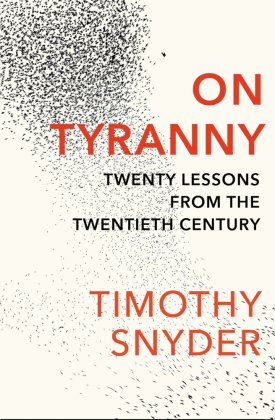
On Tyranny - Twenty Lessons from the Twentieth Century
| Verlag | Random House UK |
| Auflage | 2017 |
| Seiten | 128 |
| Format | 12,8 x 19,7 x 0,8 cm |
| B-Format | |
| Gewicht | 142 g |
| Artikeltyp | Englisches Buch |
| ISBN-10 | 1847924883 |
| EAN | 9781847924889 |
| Bestell-Nr | 84792488UA |
Wir sind nicht klüger als die Menschen, die erlebt haben, wie überall in Europa die Demokratie unterging und Faschismus, Nationalsozialismus und Kommunismus kamen. Aber einen Vorteil haben wir. Wir können aus ihren Erfahrungen lernen.
"Leiste keinen vorauseilenden Gehorsam." So lautet die erste von 20 Lektionen für den Widerstand, mit denen Timothy Snyder die Bürger der Vereinigten Staaten von Amerika vorbereitet auf das, was gestern noch unvorstellbar zu sein schien: einen Präsidenten, der das Gesicht der Demokratie verstümmelt und eine rechtsradikale Tyrannei errichtet.
Doch nicht nur in den USA sind Populismus und autoritäres Führertum auf dem Vormarsch. Auch in Europa rückt die Gefahr von rechts immer näher - als ob es das 20. Jahrhundert und seine blutigen Lehren niemals gegeben hätte. Snyders historische Lektionen, die international Aufsehen erregt haben, sind ein Leitfaden für alle, die jetzt handeln wollen - und nicht erst, wenn es zu spät ist. Lektion 8: "Se tze ein Zeichen." Dieses Buch tut es. Tun Sie es auch.
__NEW YORK TIMES BESTSELLER__
'A sort of survival book, a sort of symptom-diagnosis manual in terms of losing your democracy and what tyranny and authoritarianism look like up close' Rachel Maddow
'These 128 pages are a brief primer in every important thing we might have learned from the history of the last century, and all that we appear to have forgotten' Observer
History does not repeat, but it does instruct.
In the twentieth century, European democracies collapsed into fascism, Nazism and communism. These were movements in which a leader or a party claimed to give voice to the people, promised to protect them from global existential threats, and rejected reason in favour of myth. European history shows us that societies can break, democracies can fall, ethics can collapse, and ordinary people can find themselves in unimaginable circumstances.
History can familiarise, and it can warn. Today, we are no wiser than the Europeans who saw d emocracy yield to totalitarianism in the twentieth century. But when the political order seems imperilled, our advantage is that we can learn from their experience to resist the advance of tyranny.
Now is a good time to do so.
Rezension:
The most coherent manifesto on confronting Trump... powerful. Sarah Ditum New Statesman
